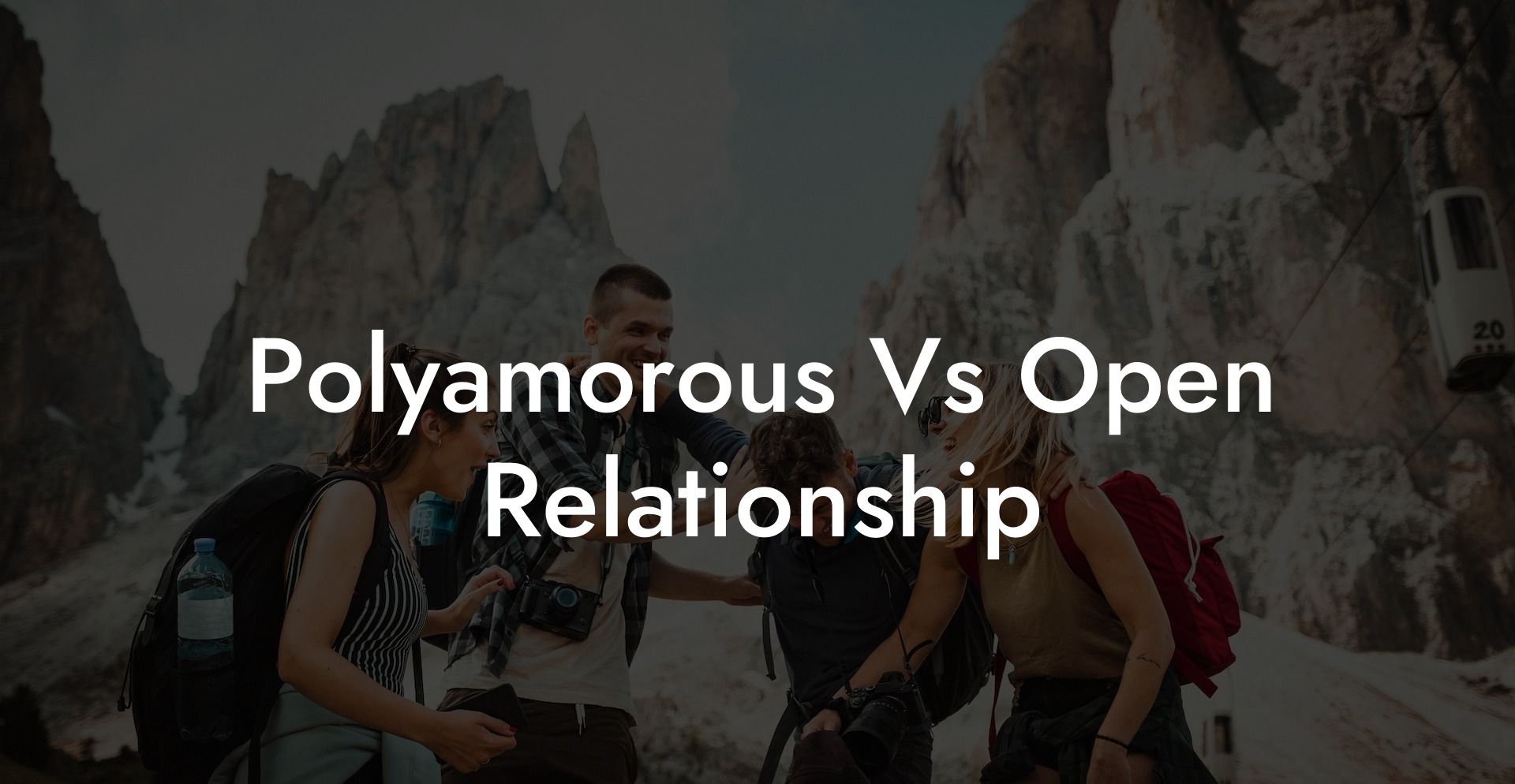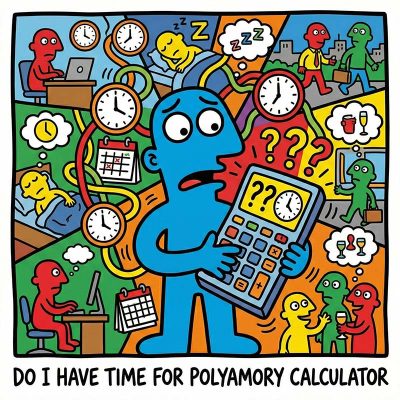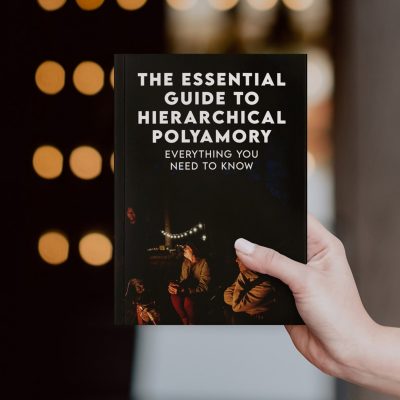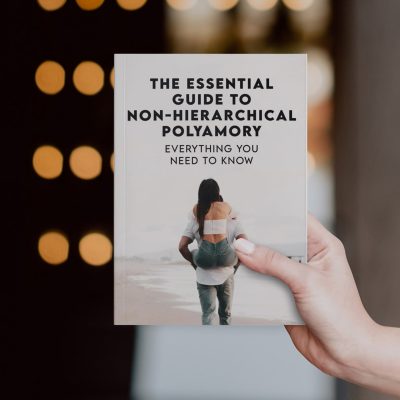Polyamorous vs Relationship: Key Differences

While the term “relationship” is often used broadly to describe any romantic or sexual connection, polyamorous relationships represent a specific lifestyle of consensual non-monogamy that differs in structure, communication, commitment, and emotional dynamics. This guide will help you understand the unique aspects of polyamory in comparison to more conventional, typically monogamous relationships.
Quick Links to Useful Sections
- Understanding Conventional Relationships
- Definition and Core Features
- Cultural and Social Context
- Understanding Polyamorous Relationships
- Definition and Core Principles
- Historical and Cultural Context
- Key Differences Between Polyamorous and Conventional Relationships
- Commitment and Exclusivity
- Structure and Relationship Dynamics
- Communication and Emotional Management
- Legal and Social Recognition
- Emotional and Psychological Dynamics
- Benefits and Challenges
- Benefits of Conventional Relationships
- Benefits of Polyamorous Relationships
- Challenges of Conventional Relationships
- Challenges of Polyamorous Relationships
- Practical Strategies for Success
- Self-Reflection and Goal Setting
- Develop Effective Communication Skills
- Establish and Maintain Clear Boundaries
- Prioritize Self-Care and Build a Support Network
- Seek Professional Guidance When Needed
- FAQ: Your Polyamorous vs Monogamous: Key Differences Questions Answered
Understanding Conventional Relationships
Definition and Core Features
A conventional relationship, often assumed to be monogamous, is typically defined as an exclusive bond between two individuals. In these relationships, both partners commit to sharing their emotional, romantic, and sexual lives solely with each other. Core features include:
- Exclusivity: Partners agree to invest their love, time, and intimacy in one another only.
- Long-Term Commitment: Conventional relationships often aim for long-term or lifelong bonds, frequently formalized through legal marriage.
- Legal Recognition: Monogamous partnerships benefit from established legal frameworks, granting rights and protections related to marriage, property, and family.
- Focused Emotional Connection: The emotional and sexual energy is concentrated in one primary relationship, leading to deep intimacy and trust.
Cultural and Social Context
Conventional, typically monogamous relationships are widely supported by cultural, religious, and legal institutions. Social norms and media representations have long reinforced the idea that a stable, exclusive bond between two people is the ideal form of romantic engagement.
Understanding Polyamorous Relationships
Definition and Core Principles
Polyamorous relationships involve the practice of engaging in multiple consensual romantic or sexual relationships simultaneously. The term “polyamory” combines the Greek prefix “poly-” (many) with the Latin “amor” (love), emphasizing the idea that love is not finite. Key principles include:
- Consensual Non-monogamy: Every relationship is formed with full, informed consent, and all partners are aware of and agree to the arrangement.
- Transparent Communication: Ongoing, open dialogue is crucial for negotiating boundaries, expressing emotional needs, and resolving conflicts among multiple partners.
- Flexible Structure: Polyamorous relationships can be organized in various ways, hierarchical (with a primary partner) or non-hierarchical (all relationships equal), depending on individual preferences.
- Emotional Diversity: Individuals in polyamorous relationships benefit from a wider range of emotional and practical support, drawing on the strengths and perspectives of multiple partners.
Historical and Cultural Context
Although the modern term “polyamory” is relatively new, forms of non-monogamous relationships have existed throughout history in various cultures. Today, polyamory is gaining recognition in progressive communities that value personal freedom, inclusivity, and open communication. Despite the growing acceptance, polyamorous relationships often lack legal recognition, which sets them apart from traditional relationships in many legal and social contexts.

Love is infinite, but your calendar is brutally finite. The fantasy is deep connection; the reality is often just exhausted "calendar tetris." Promising time you don't actually have isn't romantic, it’s a recipe for burnout and broken trust. That sinking feeling when you have to cancel again? That’s the sound of overextension destroying your relationships.
This calculator forces you to confront the math of your life. Do you actually have space for another heart, or are you just setting everyone up for disappointment?

The fantasy is total autonomy and connection. The reality? It can feel like drowning in scheduling chaos and misunderstood expectations. That anxiety you feel isn’t just stress; it’s the wobble of living without a default "anchor." Without a solid architecture, Solo Polyamory stops being a life design and starts being a recipe for burnout and confusion.
The Essential Guide replaces the drift with a concrete anchor. We provide the "Solo Ethic," boundary scripts, and burnout protocols needed to protect your peace. Don't just date around—build a life that actually works for you.

Hierarchy sounds like a corporate org chart until someone gets their feelings hurt. That stomach-turning fear that you are just a "secondary" who can be fired at any time is real. If your relationship feels like a secret ranking system, you are doing it wrong.
Ambiguity is where resentment grows. The Essential Guide replaces the "who matters more" panic with a concrete charter. We provide the scripts and equity guardrails needed to protect every heart in the polycule. Stop guessing and start building.

The ideal is pure equality. The reality? It often slides into hidden rankings where someone gets hurt. That sinking feeling that you are secretly a "secondary" despite the label? That is your intuition detecting couple privilege. Ambiguity is where resentment thrives.
The Essential Guide replaces vague promises with concrete governance. We provide the charters, equity tools, and jealousy protocols needed to ensure "non-hierarchical" isn't just a fantasy. Stop guessing who matters most. Build a network that is actually fair.

The fantasy is total autonomy and connection. The reality? It can feel like drowning in scheduling chaos and misunderstood expectations. That anxiety you feel isn’t just stress; it’s the wobble of living without a default "anchor." Without a solid architecture, Solo Polyamory stops being a life design and starts being a recipe for burnout and confusion.
The Essential Guide replaces the drift with a concrete anchor. We provide the "Solo Ethic," boundary scripts, and burnout protocols needed to protect your peace. Don't just date around—build a life that actually works for you.

Hierarchy sounds like a corporate org chart until someone gets their feelings hurt. That stomach-turning fear that you are just a "secondary" who can be fired at any time is real. If your relationship feels like a secret ranking system, you are doing it wrong.
Ambiguity is where resentment grows. The Essential Guide replaces the "who matters more" panic with a concrete charter. We provide the scripts and equity guardrails needed to protect every heart in the polycule. Stop guessing and start building.
Key Differences Between Polyamorous and Conventional Relationships
Commitment and Exclusivity
Conventional Relationships: These relationships are built on exclusivity, where both partners invest solely in each other. This model often leads to a deeply focused emotional bond and a clear division of roles.
Polyamorous Relationships: Polyamory distributes commitment across multiple partners. While some individuals designate a primary partner, others operate on a non-hierarchical basis. The emphasis is on building multiple, meaningful connections simultaneously rather than focusing on a single exclusive bond.
Structure and Relationship Dynamics
Conventional Relationships: Tend to have a straightforward structure with clear roles, responsibilities, and expectations. The dynamics are generally centered on two people, making day-to-day management and decision-making more streamlined.
Polyamorous Relationships: Feature a more complex structure that requires ongoing negotiation and coordination among several partners. This complexity can offer diverse support but also demands advanced communication and boundary-setting skills.
Communication and Emotional Management
Conventional Relationships: Typically involve bilateral communication focused on deepening a single emotional bond. While conflicts may arise, they are generally resolved directly between the two individuals.
Polyamorous Relationships: Require multi-directional communication among all partners. Regular, transparent discussions are essential to manage multiple emotional connections, negotiate boundaries, and address potential issues such as jealousy or insecurity.
Legal and Social Recognition
Conventional Relationships: Often benefit from robust legal frameworks, including marriage laws that provide rights and protections related to inheritance, custody, and spousal benefits.
Polyamorous Relationships: Typically do not receive formal legal recognition. This can result in challenges in areas like legal rights and benefits, even though the relationships are fully consensual and ethically managed.
Emotional and Psychological Dynamics
Conventional Relationships: The focused, exclusive nature of monogamy often fosters a deep sense of security and trust. However, relying on one partner for all emotional support may also limit the diversity of perspectives and care.
Polyamorous Relationships: Provide a richer network of emotional support from multiple partners, which can contribute to personal growth and resilience. At the same time, managing complex emotions across several relationships can be challenging and requires high levels of self-awareness and emotional intelligence.
Benefits and Challenges
Benefits of Conventional Relationships
- Simplicity and Clarity: With only two people involved, roles, expectations, and responsibilities are generally easier to manage.
- Legal Recognition: Exclusive partnerships are widely supported by legal institutions, offering concrete benefits and protections.
- Focused Emotional Bond: A singular commitment can foster a deep, secure emotional connection.
Benefits of Polyamorous Relationships
- Diverse Support: Multiple partners can provide varied emotional, intellectual, and practical support.
- Personal Growth: The complexity of managing several relationships can lead to increased self-awareness and improved communication skills.
- Flexibility: Polyamory allows for a customized approach to love, where individuals can tailor their relationships to their unique needs.
- Enhanced Exploration: Engaging in multiple connections can broaden one’s understanding of intimacy and personal fulfillment.
Challenges of Conventional Relationships
- Emotional Stagnation: Some couples may experience a decline in excitement or novelty over time.
- Limited Diversity: Relying solely on one partner for emotional support might leave some needs unmet.
Challenges of Polyamorous Relationships
- Complex Emotional Dynamics: Managing multiple deep connections requires advanced communication and emotional regulation skills.
- Time and Energy Management: Balancing attention among several partners can be demanding and may lead to burnout if not managed well.
- Legal and Social Limitations: Polyamorous relationships generally lack formal legal recognition and may face social stigma.
Practical Strategies for Success
Self-Reflection and Goal Setting
Reflect on your personal values and relationship goals. Consider what level of commitment, exclusivity, and emotional diversity best suits your lifestyle and personality.
Develop Effective Communication Skills
Whether you are in a conventional or polyamorous relationship, clear communication is key. Schedule regular check-ins, use active listening techniques, and be willing to revisit and renegotiate boundaries as needed.
Establish and Maintain Clear Boundaries
Set clear expectations early on. For monogamous relationships, this may involve defining what exclusivity means for both partners. In polyamorous relationships, negotiate boundaries among all partners to ensure that everyone’s needs are respected.
Prioritize Self-Care and Build a Support Network
Take care of your own well-being through regular self-care practices, and connect with communities or support groups that resonate with your chosen relationship model.
Seek Professional Guidance When Needed
Consider counseling or therapy to help navigate complex emotional dynamics, whether you are facing challenges in a conventional relationship or managing multiple connections in a polyamorous arrangement.
FAQ: Your Polyamorous vs Monogamous: Key Differences Questions Answered
1. What is a monogamous relationship?
A monogamous relationship is an exclusive, committed partnership between two individuals who agree to share their romantic and sexual lives only with each other.
2. What is a polyamorous relationship?
A polyamorous relationship involves engaging in multiple consensual romantic or sexual relationships simultaneously, with each partner aware of and consenting to the arrangement.
3. How do commitment levels differ between these models?
Monogamy focuses on a single, exclusive bond, while polyamory distributes commitment across multiple relationships, each with its own level of emotional and relational significance.
4. What are the legal differences?
Monogamous marriages are legally recognized and come with defined rights and benefits. Polyamorous relationships generally lack formal legal recognition, which can impact areas like inheritance and spousal benefits.
5. How do communication requirements differ?
Monogamous relationships typically involve focused, bilateral communication, whereas polyamorous relationships require ongoing, multi-directional dialogue among all partners.
6. What are the main emotional differences between the two models?
Monogamy tends to cultivate a deep, exclusive emotional bond, while polyamory offers a diverse network of emotional support, requiring advanced skills to manage complex emotions such as jealousy.
7. Where can I find additional resources on these topics?
Additional resources include books like "The Ethical Slut" by Dossie Easton & Janet Hardy and "More Than Two" by Franklin Veaux & Eve Rickert, podcasts such as "Multiamory" and "Polyamory Weekly," and online communities like r/polyamory.
Resources and Community Support: Your Next Steps
- "The Ethical Slut" by Dossie Easton & Janet Hardy – A seminal book on ethical non-monogamy offering deep insights into various relationship models.
- "More Than Two" by Franklin Veaux & Eve Rickert – A guide providing practical advice on managing relationship dynamics in both monogamous and polyamorous settings.
- Podcasts: Listen to "Multiamory" and "Polyamory Weekly" for engaging discussions and personal experiences on different relationship models.
- Online Communities: Join forums such as r/polyamory to exchange ideas and receive support.
- Workshops and Webinars: Attend events focused on relationship psychology and ethical non-monogamy to expand your knowledge and connect with like-minded individuals.
By exploring these resources and applying the strategies outlined in this guide, you can develop a clear, informed understanding of the key differences between polyamorous and monogamous relationships. Embrace continuous learning, open dialogue, and self-reflection as you navigate the diverse landscape of intimacy and commitment.

Love is infinite, but your calendar is brutally finite. The fantasy is deep connection; the reality is often just exhausted "calendar tetris." Promising time you don't actually have isn't romantic, it’s a recipe for burnout and broken trust. That sinking feeling when you have to cancel again? That’s the sound of overextension destroying your relationships.
This calculator forces you to confront the math of your life. Do you actually have space for another heart, or are you just setting everyone up for disappointment?

The fantasy is total autonomy and connection. The reality? It can feel like drowning in scheduling chaos and misunderstood expectations. That anxiety you feel isn’t just stress; it’s the wobble of living without a default "anchor." Without a solid architecture, Solo Polyamory stops being a life design and starts being a recipe for burnout and confusion.
The Essential Guide replaces the drift with a concrete anchor. We provide the "Solo Ethic," boundary scripts, and burnout protocols needed to protect your peace. Don't just date around—build a life that actually works for you.

Hierarchy sounds like a corporate org chart until someone gets their feelings hurt. That stomach-turning fear that you are just a "secondary" who can be fired at any time is real. If your relationship feels like a secret ranking system, you are doing it wrong.
Ambiguity is where resentment grows. The Essential Guide replaces the "who matters more" panic with a concrete charter. We provide the scripts and equity guardrails needed to protect every heart in the polycule. Stop guessing and start building.

The ideal is pure equality. The reality? It often slides into hidden rankings where someone gets hurt. That sinking feeling that you are secretly a "secondary" despite the label? That is your intuition detecting couple privilege. Ambiguity is where resentment thrives.
The Essential Guide replaces vague promises with concrete governance. We provide the charters, equity tools, and jealousy protocols needed to ensure "non-hierarchical" isn't just a fantasy. Stop guessing who matters most. Build a network that is actually fair.

The fantasy is total autonomy and connection. The reality? It can feel like drowning in scheduling chaos and misunderstood expectations. That anxiety you feel isn’t just stress; it’s the wobble of living without a default "anchor." Without a solid architecture, Solo Polyamory stops being a life design and starts being a recipe for burnout and confusion.
The Essential Guide replaces the drift with a concrete anchor. We provide the "Solo Ethic," boundary scripts, and burnout protocols needed to protect your peace. Don't just date around—build a life that actually works for you.

Hierarchy sounds like a corporate org chart until someone gets their feelings hurt. That stomach-turning fear that you are just a "secondary" who can be fired at any time is real. If your relationship feels like a secret ranking system, you are doing it wrong.
Ambiguity is where resentment grows. The Essential Guide replaces the "who matters more" panic with a concrete charter. We provide the scripts and equity guardrails needed to protect every heart in the polycule. Stop guessing and start building.
Aging And Long Term Care Planning As Solo Poly
Attachment Styles And Solo Polyamory
Autonomy And Self Partnership As Foundations
Avoiding Avoidance Disguised As Autonomy
Avoiding Being Treated As An Accessory Relationship
Balancing Independence And Intimacy
Balancing Multiple Partners Without Burnout
Barrier Use Conversations With Multiple Partners
Boundaries Versus Rules In Solo Poly Relationships
Breakups And Grief While Staying Solo
Building Emotional Availability As Solo Poly
Caregiving And Illness Support Without A Nesting Partner
Co Parenting Agreements And Boundaries
Co Parenting And Family Building As Solo Poly
Coming Out As Solo Polyamorous
Common Mistakes Partners Make With Solo Poly People
Common Mistakes Solo Poly People Make
Common Myths About Solo Polyamory
Communication Check Ins That Fit Solo Poly
Community And Chosen Family For Solo Poly People
Compersion And Neutrality Toward Partner Dating
Conflict Resolution Without Couple Default
Core Values Of Solo Polyamory
Creating Agreements That Preserve Independence
Creating Secure Attachment Without Traditional Milestones
Dating People Who Want Escalation
De Escalation As A Healthy Choice
Decentering Couple Norms And Escalator Scripts
Deciding Whether Solo Polyamory Is Right For You
Defining Relationship Depth Without Shared Living
Defining Success Without Traditional Milestones
Designing A Sustainable Solo Poly Life
Digital Safety And Privacy
Disability And Access Needs As Solo Poly
Emergency Contacts And Support Planning
End Of Life Planning And Legal Documents
Energy Management And Overextension Risks
Financial Independence And Entanglement Decisions
Finding Solo Poly Friendly Community
Friendships As Core Support Structures
Gifts Trips And Resource Boundaries
Handling Being The Newest Partner
Handling Judgment From Monogamous Culture
Handling Judgment From Poly Communities
Handling Last Minute Plan Changes
Holidays And Special Occasions As Solo Poly
Housing Choices And Living Alone
How To Disclose Solo Polyamory Early While Dating
How To Explain Solo Polyamory To Partners
In Person Events And Support Networks
Intersectionality In Solo Poly Experiences
Long Distance Relationships And Solo Poly
Maintaining Rituals Without Domestic Integration
Maintaining Self Partnership Through Loss
Managing Insecurity Without Default Reassurance
Managing Metamour Dynamics Without Centering A Couple
Managing Nre Without Losing Yourself
Navigating Jealousy As A Solo Poly Person
Navigating Marriage Offers As Solo Poly
Navigating Partners With Nesting Or Spouses
Pacing New Connections Ethically
Parallel Versus Kitchen Table Preferences
Parenting Without A Primary Partner Model
Pregnancy And Fertility Conversations For Solo Poly
Privacy And Information Sharing Consent
Processing Loneliness While Staying Solo
Protecting Personal Time Without Withholding Connection
Quality Time When You Do Not Share A Home
Race Gender And Class Factors In Solo Poly
Religion Culture And Family Expectations
Relocation And Maintaining Connections
Repair After Misunderstandings With Partners
Responding To Requests For Primary Status
Risk Profiles And Informed Consent
Screening For People Who Respect Autonomy
Self Worth Outside Relationship Status
Setting Expectations With Highly Partnered People
Sexual Health Agreements As A Solo Poly Person
Shared Housing With Friends And Community
Signs Solo Polyamory Is Working Well
Social Media Boundaries And Visibility
Solo Polyamory And Career Mobility
Solo Polyamory And Commitment
Solo Polyamory And Mental Health Support
Solo Polyamory And Metamour Relationships
Solo Polyamory Versus Being Single
Solo Polyamory Versus Non Hierarchical Polyamory
Solo Polyamory Versus Relationship Anarchy
Substance Use Boundaries And Consent
Testing Schedules And Disclosure Practices
The History And Evolution Of Solo Polyamory
Therapy And Coaching For Solo Polyamory
Time And Scheduling As A Solo Poly Person
Transparency Without Being Managed
Travel And Overnights Without Implied Escalation
Warning Signs Of Isolation Masquerading As Autonomy
What Commitment Looks Like Without Nesting
What Solo Polyamory Is And What It Is Not
Why People Choose Solo Polyamory
Writing A Solo Poly Dating Profile
Accountability When Harm Occurs
Aging And Long Term Planning
Alternatives To Veto Policies
Attachment Styles And Hierarchy
Avoiding Disposable Partner Dynamics
Avoiding Entitlement In Primary Relationships
Avoiding Objectification And Ranking Language
Blended Families And Co Parenting Dynamics
Boundaries Versus Rules In Hierarchical Contexts
Caregiving And Illness Decisions
Choosing Hierarchy Intentionally
Common Challenges Faced By Secondary Partners
Common Mistakes Primary Partners Make
Common Mistakes Secondary Partners Make
Common Myths About Hierarchical Polyamory
Communicating Limits Without Devaluing Others
Community Perception Of Hierarchical Polyamory
Compersion When Time And Resources Are Unequal
Consent And Transparency In Hierarchy
Consent Under Unequal Power Dynamics
Cultural And Socioeconomic Influences On Hierarchy
De Escalation Without Punishment
Deciding Whether Hierarchical Polyamory Is Right For You
Decision Making Power In Primary Relationships
Descriptive Versus Prescriptive Hierarchy
Emotional Labor Distribution Across Partners
Emotional Regulation Skills For Hierarchical Dynamics
Emotional Safety For Non Primary Partners
Ending Relationships Ethically Within Hierarchy
Ethical Foundations Of Hierarchical Structures
Ethical Storytelling About Hierarchical Relationships
Ethical Use Of Veto Power
Fear Of Replacement Or Demotion
Financial Transparency With Multiple Partners
Handling Breakups Within A Hierarchical System
Hierarchy Versus Relationship Anarchy
Holidays Vacations And Special Occasions
How Hierarchical Polyamory Differs From Non Hierarchical Polyamory
How Hierarchical Polyamory Evolves Over Time
How Privilege Shows Up In Daily Decisions
How To Disclose Hierarchy Early In Dating
Inclusion Versus Exclusion Practices
Integrating Hierarchy With Personal Values
Integrating New Partners Ethically
Intersectionality And Power In Hierarchy
Jealousy In Hierarchical Polyamory
Legal Risks And Protections
Lessons Hierarchical Polyamory Teaches About Love
Letting Go Of Hierarchy When It No Longer Fits
Living Together Versus Living Apart
Long Distance Relationships Within Hierarchy
Managing Boundary Violations
Managing Comparison Between Partners
Marriage And Legal Privilege In Hierarchical Polyamory
Measuring Fulfillment Beyond Priority Status
Navigating Attachment As A Secondary Partner
Navigating Conflicts Between Partners At Different Levels
Navigating Judgment From Non Hierarchical Communities
Ongoing Check Ins Across Relationship Levels
Opening Or Closing The Hierarchy
Parenting And Family Planning Within Hierarchy
Power Imbalances Inherent In Hierarchy
Pregnancy And Parenting Transitions
Primary Secondary And Tertiary Relationship Definitions
Privacy And Information Flow
Re Negotiating Hierarchy After Major Life Events
Rebuilding Trust After Structural Changes
Renegotiating Primary Agreements Over Time
Repair Conversations After Hierarchical Tension
Repairing Harm Caused By Hierarchical Decisions
Resentment And Unspoken Grief
Responsibilities And Expectations Of Primary Partners
Rules That Protect Versus Rules That Control
Scheduling Fairness Versus Equality
Self Worth Outside Relationship Rank
Setting Clear Expectations With New Partners
Shared Finances And Resource Prioritization
Signs Hierarchy Is Functioning Well
Supporting Mental Health Across The Network
Supporting Secondary Partners Through Transitions
The Origins And History Of Hierarchical Polyamory
The Role Of Nesting Partners
Therapy And Coaching For Hierarchical Polyamory
Time Allocation And Scheduling Priorities
Transparency Without Oversharing
Treating All Partners As Whole People
Understanding Couple Privilege
Warning Signs Of Unhealthy Hierarchy
What Hierarchical Polyamory Is And What It Is Not
What It Means To Be A Primary Partner
What It Means To Be A Secondary Partner
What People Wish They Knew Earlier
What Success Looks Like In Hierarchical Polyamory
When Hierarchy Activates Past Trauma
When Hierarchy Becomes Coercive
When Hierarchy Emerges Without Intention
When Primary Relationships Change
When Professional Support Is Needed
When Secondary Relationships Deepen
Why Hierarchy Exists In Some Polyamorous Relationships
Accountability When Harm Occurs
Aging And Long Term Planning
Alternatives To Veto Policies
Attachment Styles And Hierarchy
Avoiding Disposable Partner Dynamics
Avoiding Entitlement In Primary Relationships
Avoiding Objectification And Ranking Language
Blended Families And Co Parenting Dynamics
Boundaries Versus Rules In Hierarchical Contexts
Caregiving And Illness Decisions
Choosing Hierarchy Intentionally
Common Challenges Faced By Secondary Partners
Common Mistakes Primary Partners Make
Common Mistakes Secondary Partners Make
Common Myths About Hierarchical Polyamory
Communicating Limits Without Devaluing Others
Community Perception Of Hierarchical Polyamory
Compersion When Time And Resources Are Unequal
Consent And Transparency In Hierarchy
Consent Under Unequal Power Dynamics
Cultural And Socioeconomic Influences On Hierarchy
De Escalation Without Punishment
Deciding Whether Hierarchical Polyamory Is Right For You
Decision Making Power In Primary Relationships
Descriptive Versus Prescriptive Hierarchy
Emotional Labor Distribution Across Partners
Emotional Regulation Skills For Hierarchical Dynamics
Emotional Safety For Non Primary Partners
Ending Relationships Ethically Within Hierarchy
Ethical Foundations Of Hierarchical Structures
Ethical Storytelling About Hierarchical Relationships
Ethical Use Of Veto Power
Fear Of Replacement Or Demotion
Financial Transparency With Multiple Partners
Handling Breakups Within A Hierarchical System
Hierarchy Versus Relationship Anarchy
Holidays Vacations And Special Occasions
How Hierarchical Polyamory Differs From Non Hierarchical Polyamory
How Hierarchical Polyamory Evolves Over Time
How Privilege Shows Up In Daily Decisions
How To Disclose Hierarchy Early In Dating
Inclusion Versus Exclusion Practices
Integrating Hierarchy With Personal Values
Integrating New Partners Ethically
Intersectionality And Power In Hierarchy
Jealousy In Hierarchical Polyamory
Legal Risks And Protections
Lessons Hierarchical Polyamory Teaches About Love
Letting Go Of Hierarchy When It No Longer Fits
Living Together Versus Living Apart
Long Distance Relationships Within Hierarchy
Managing Boundary Violations
Managing Comparison Between Partners
Marriage And Legal Privilege In Hierarchical Polyamory
Measuring Fulfillment Beyond Priority Status
Navigating Attachment As A Secondary Partner
Navigating Conflicts Between Partners At Different Levels
Navigating Judgment From Non Hierarchical Communities
Ongoing Check Ins Across Relationship Levels
Opening Or Closing The Hierarchy
Parenting And Family Planning Within Hierarchy
Power Imbalances Inherent In Hierarchy
Pregnancy And Parenting Transitions
Primary Secondary And Tertiary Relationship Definitions
Privacy And Information Flow
Re Negotiating Hierarchy After Major Life Events
Rebuilding Trust After Structural Changes
Renegotiating Primary Agreements Over Time
Repair Conversations After Hierarchical Tension
Repairing Harm Caused By Hierarchical Decisions
Resentment And Unspoken Grief
Responsibilities And Expectations Of Primary Partners
Rules That Protect Versus Rules That Control
Scheduling Fairness Versus Equality
Self Worth Outside Relationship Rank
Setting Clear Expectations With New Partners
Shared Finances And Resource Prioritization
Signs Hierarchy Is Functioning Well
Supporting Mental Health Across The Network
Supporting Secondary Partners Through Transitions
The Origins And History Of Hierarchical Polyamory
The Role Of Nesting Partners
Therapy And Coaching For Hierarchical Polyamory
Time Allocation And Scheduling Priorities
Transparency Without Oversharing
Treating All Partners As Whole People
Understanding Couple Privilege
Warning Signs Of Unhealthy Hierarchy
What Hierarchical Polyamory Is And What It Is Not
What It Means To Be A Primary Partner
What It Means To Be A Secondary Partner
What People Wish They Knew Earlier
What Success Looks Like In Hierarchical Polyamory
When Hierarchy Activates Past Trauma
When Hierarchy Becomes Coercive
When Hierarchy Emerges Without Intention
When Primary Relationships Change
When Professional Support Is Needed
When Secondary Relationships Deepen
Why Hierarchy Exists In Some Polyamorous Relationships
Lost & confused by all of the terms, types and seemingly made up 3 letter acronyms?? We've got you. Check out our Ethnical Non-Monogamy Dictionary >>
Useful Interruption: Not sure which relationship vibe fits you best? Take the Ultimate Relationship Test, it will give you details into your natural relationship style. Then, dive into our binge-worthy guides, from the tried-and-true to the “wait, that’s a thing?", and find the perfect relationship type for your life.
Now back to the main article but yeah take the Ultimate Relationship Test
